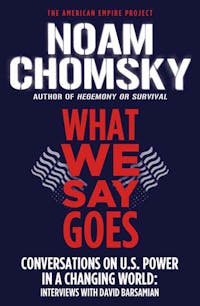What We Say Goes
Conversations on U.S. Power in a Changing World
 Download image
Download image
ISBN10: 0805086714
ISBN13: 9780805086713
Trade Paperback
240 Pages
$19.99
CA$27.25
In this new collection of conversations, conducted in 2006 and 2007, Noam Chomsky explores what he considers the most immediate and urgent concerns: Iran's challenge to the United States, the deterioration of the Israel-Palestine conflict, the rise of China, the growing power of the left in Latin America, the Democratic victory in the 2006 U.S. midterm elections and the upcoming presidential race. As always, Chomsky presents his ideas vividly and accessibly, with uncompromising principle and clarifying insight.
The latest volume from a long-established partnership between Chomsky and David Barsamian, What We Say Goes will engage a new generation of readers, as well as longtime Chomsky fans eager for his latest thinking on the many crises we now confront, both at home and abroad.
What We Say Goes is also available on CD as an unabridged audiobook, read by the authors. Please email academic@macmillan.com for more information.
Reviews
Praise for What We Say Goes
"Linguist, philosopher, and political activist Chomsky has long been critical of U.S. foreign policy and has authored many books expressing his views, beginning with American Power and the New Mandarins. This latest book gathers 2006-07 interviews with radio journalist Barsamian, a frequent partner in dialog with Chomsky—they have produced at least six books together prior to this one. Presented in chronological order, these conversations cover many topics frequently in the news, including the Middle East and Iraq, Latin America, trade and globalization, and Israel. Despite the format, statements are extensively footnoted, with references to both mainstream media and the web sites of relevant organizations. The basic points are not new: that the United States regularly, through many administrations, violates international law, assuming that as sole superpower it can do whatever it chooses whenever it decides to. Chomsky criticizes those journalists and public intellectuals who, in reporting and commenting on events, do not question the assumptions under which the country acts and have framed the debate so that only the details are fodder for discussion. Chomsky's points are challenging."—Library Journal
Reviews from Goodreads
BOOK EXCERPTS
Read an Excerpt
Chapter 1
James Traub, in the New York Times Magazine, writes, "Of course, treaties and norms don't restrain the outlaws. The prohibition on territorial aggression enshrined in the UN Charter didn't faze Saddam Hussein when he decided to...
Listen to an Excerpt from the Audiobook
Download MP3MEDIA
Watch
Noam Chomsky Speaks with David Barsamian--What We Say Goes Audiobook Excerpt
Listen to David Barsamian interview Noam Chomsky in this audiobook excerpt from What We Say Goes: Conversations on U.S. Power in a Changing World. In this collection of conversations, Noam Chomsky explores the most immediate and urgent concerns: Iran's challenge to the United States, the deterioration of the Israel-Palestine conflict, the ongoing occupations of Iraq and Afghanistan, the rise of China, and the growing power of the left in Latin America.
Share This


